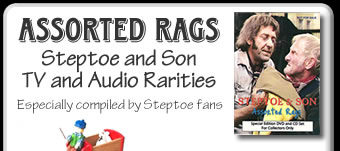

 |
|||
 |
|||
Steptoe and Son |
|
To the firm of Steptoe and Son, Scrap Merchants, have come fame and nationwide affection. Their unique place in the gallery of British comic characters is secure.
Their robust humour may be broader than it is long, but pathos and humanity also have their places in these down-to-earth, hilariously funny tales. When Ray Galton and Alan Simpson first got together to write comedy sketches, they wrote to Frank Muir & Denis Norden - then the kings of radio comedy-writing - asking for some tips. Muir & Norden knew better than to get involved, so they wrote back suggesting that Gale Pedrick, a script editor at the BBC, was the man to contact. As Pedrick later remembered it: One August day in 1951 there arrived in my office the script of a humorous sketch, badly typed on (as I learnt later) a borrowed machine. It amused me so much that I sent a telegram to the authors' address in South London, asking them to come to see me. Curious then that some 13 years later Pedrick should be the man drafted in to flesh out some of Galton & Simpson's Steptoe & Son scripts for the sake of a paperback book of 'the TV comedy hit of the century'. (No kidding, that's what it claims.) He does a pretty fair job of it, as well, as you'd expect from a man whose writing experience stretched back as far as George Formby. As is normally the way with these things, it's virtually all dialogue, which isn't a bad thing in this instance, given the masterful scripts, but Pedrick's opening description of the house is pretty good, and I liked the idea of the two of them sitting at a table in silence, separated by 'a huge brown teapot, rather like a squat, menacing referee waiting to see fair play.' A decent piece of work then, augmented by Steptoe & Son at the Palace, which followed two years later (and cost a shilling more - proper inflation we had in those days), except... ...except that I have my doubts about Steptoe. I grew up listening to my dad's reel-to-reel tapes of British comedy and, while Hancock was always my favourite, Steptoe had a place in my affections as well. But now I find the TV shows almost unwatchable, and the radio shows hard going as well. The writing is superb, and the acting was tremendous, but - be honest - it's not really funny anymore, is it? And in the absence of laughs, it becomes horribly depressing. Galton & Simpson were probably the most intelligent writers in the history of British sitcom, but in Steptoe they veered off into the territory of modern drama: the sheer misery of Harold's inability to leave home is the stuff of Pinter or Beckett. |